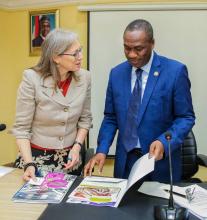Nigeria re-commits to eradicating Tuberculosis and controlling Noncommunicable Diseases by 2030.
Abuja, March 6, 2020- Nigeria has re-committed to eradicating Tuberculosis (TB) and controlling Noncommunicable Diseases (NCDs) by 2030. This was re-iterated at the just concluded United Nations High-level Joint Programming mission on TB and NCDs.
The mission involved 12 UN agencies, two observers and over 30 members advocating for whole-of-government and whole-of-society responses to both NCDs and TB, strategizing for effective UN support to the Government of Nigeria as well as aligning TB and NCD responses. During the mission, the Kick TB out of Nigeria campaign was launched and the mission members were hosted by the President.
In a press briefing at the end of the mission, Nigeria’s Minister of Health, Dr. Osagie Ehanire, committed the Federal Government in effectively implementing the mission recommendations towards reducing the burden of TB and NCDs in the country. The minister said, “The high burden of NCDs and TB in Nigeria is indeed alarming, we are hence very happy for this timely mission, to support and strengthen coordinated policy, strategy and programming in Nigeria in the fight against the diseases, which both feature prominently in the Sustainable Development Goals.”
Nigeria ranks fourth among 30 TB High Burden Countries in the World and is highest high burden Country in Africa. Ending the TB epidemic by 2030 is an SDG target and the United Nations held its first high-level meeting on the fight against TB in 2018 which resulted in a political declaration reaffirming the 2030 End TB Strategy Targets and setting new interim targets for universal access to TB care and prevention by 2022.
The country’s TB case detection rate has only moved from 17% to 24% in the last five years. This is in part as a result of having only 20% of health facilities able to provide TB services. According to the WHO 2019 Global TB Report, 20% of TB cases in Nigeria are estimated to be attributable to malnutrition, 12% to HIV, 3 to diabetes, and 1% to alcohol use disorder.
Data further indicate that NCDs accounted for about 29% of all deaths in Nigeria with cardiovascular diseases (CVDs) responsible for 11%, cancers 4%, chronic respiratory diseases 2% and diabetes 1%. Estimated premature mortality which is the probability of dying between ages 30 and 70 years from the four main NCDs was 22%. WHO intends to support Nigeria in implementing the recommendations and Dr Rex Mpazanje of WHO said, “Implementation of the recommendations would help to reduce the burden of the diseases in the country.”
The United Nations system has undertaken more than 20 similar programming country missions on NCDs. Nigeria is the first country to host a joint mission on NCDs and TB serving as a model to integrate NCDs with other diseases, going forward. The mission was coordinated by the WHO Nigeria and WHO African Regional Office in close collaboration with the Task Force Secretariat and the Global Tuberculosis Programme. Mission members included the African Development Bank, FAO, IAEA, IOM, OHCHR, UNHCR, UNAIDS, UNDP, UNICEF, UNFPA, UNODC, WHO, World Bank, USAID and Public Health England as observers.





